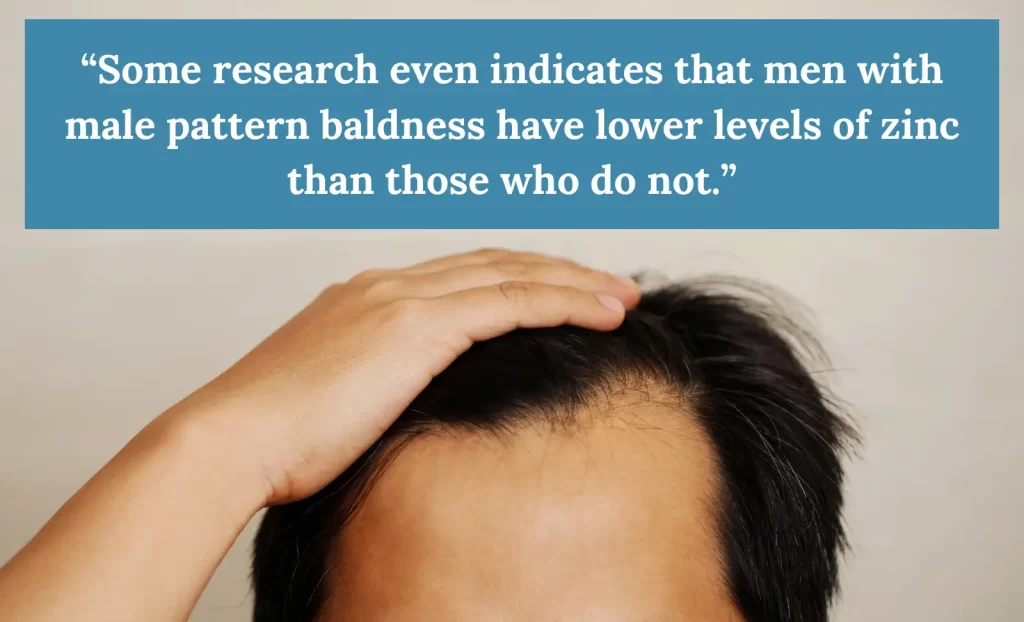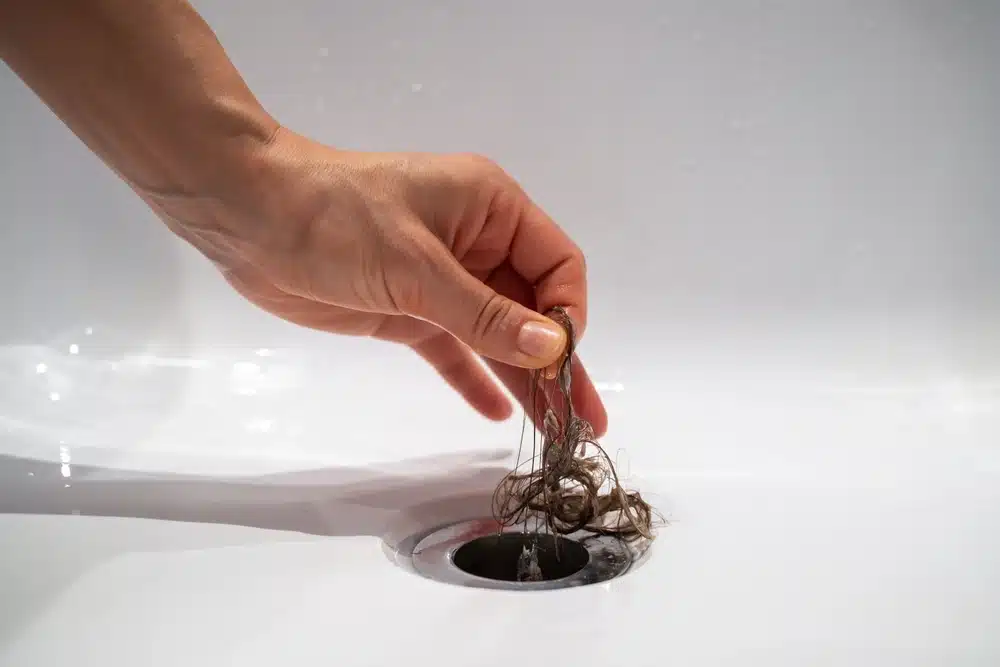Zinc plays a crucial role in growing healthy hair, with a zinc deficiency potentially leading to hair shedding. Taking zinc supplements can fix this. However, zinc only works for boosting hair growth if there is a zinc deficiency present. For hair loss caused by genetic or hormonal factors, a more targeted hair restoration treatment is key.
- What is Zinc? Zinc is an essential mineral that cannot be produced by the body alone, so people need to get it through diet. It’s responsible for things like wound healing, immune system support, and enzyme activity.
- Can a Zinc Deficiency Cause Hair Loss? Yes, a zinc deficiency can cause hair loss. This is because zinc plays a role in supporting healthy hair follicles. Plus, not getting enough zinc may lead to telogen effluvium, known as stress-induced hair loss.
- What Are the Signs of a Zinc Deficiency? The most common signs of a zinc deficiency include skin rashes, unhealing skin wounds, being more susceptible to infections, and hair loss.
- Can You Take Too Much Zinc? Yes, taking too much zinc is possible, and it can cause problems such as nausea, headaches, and fatigue. It can also interfere with the absorption of iron and copper.
If you have hair loss, you’ve likely tried to find out the root cause of it. It’s not always easy to pin down. There are more common reasons behind hair loss, such as androgenetic alopecia, which affects up to half of men and women. [1] Then, there are the less common reasons behind hair loss, such as certain nutritional deficiencies.
One thing you may have heard while doing research into the causes of hair loss is that a zinc deficiency can cause it. How much truth is there to that? Can you take zinc for hair loss? Keep reading to find out everything you need to know.
What is Zinc?
Zinc is an essential mineral for the human body and is found naturally in a range of foods—although many foods are also fortified with zinc. The body cannot store zinc, which means zinc levels need to be topped up consistently through the diet. It’s important to do so, too, as zinc helps the body perform its functions, including healing wounds, strengthening the immune system, and blood clotting.
Unfortunately, zinc deficiencies are quite common, affecting around 1.1 billion people in the world. [2] Those in developing countries are more likely to have this deficiency, but it can affect anyone in any country.
Zinc for Hair Loss: What’s the Link?
There is a definite link between zinc and hair loss, as hair loss is one of the symptoms of a zinc deficiency. That means if your zinc levels are low, you may begin to lose your hair. Some research even indicates that men with male pattern baldness have lower levels of zinc than those who do not. [3] While more research needs to be placed into this to know the exact link, it’s still worth acknowledging if you’re low in zinc and experiencing hair loss.
However, it’s important to also keep in mind that zinc levels only affect the hair when a person has low levels and doesn’t work for everyone as a hair loss treatment. If you are already consuming enough zinc in your usual diet (which most people do), then there’s little evidence to suggest taking more zinc will boost hair growth at all.
The Impact of Zinc on Overall Health
Hair loss isn’t the only symptom of low zinc levels – nor is it the most serious one. A zinc deficiency can wreak havoc on your overall health, leading to the body being unable to perform its essential functions. [4] As well as hair loss, here are the symptoms that can occur:
- Skin Changes
- Loss of Taste
- Loss of Smell
- Slow-healing Wounds
- Infections
- Problems Concerning the Eyes
Hair loss is obviously an unfortunate symptom for anyone to deal with, but that might be the least of your worries if zinc leads to infections. There’s even evidence that shows a zinc deficiency makes a person more at risk of diabetes mellitus and obesity. [5] If you’re worried you have zinc hair loss, get in touch with your doctor.
Causes of Zinc Deficiencies
There are two main reasons a person may develop a zinc deficiency: their diet or a medical condition.
Diet
People often don’t get enough zinc in their diet due to a lack of meat, too much phytates, or too much oxalates. [6] Phytates include things like seeds and legumes. While these are healthy foods and important, too much can affect zinc absorption. If you’re worried your diet is causing a zinc deficiency, it’s best to speak to your doctor or a dietician to get medical advice.
Medical Conditions
Some conditions can also cause a zinc deficiency, including:
- Kidney Disease
- Certain Cancers
- Celiac Disease
- Diabetes
- Crohn’s Disease
- Sickle Cell Disease
Diagnosing a Zinc Deficiency
A doctor should be able to diagnose a zinc deficiency after one appointment. They will either take a blood test or a urine test to get the results. However, the results are not always definite, as healthy zinc levels are already quite low, and the body doesn’t need too much to function. Often, a doctor will make a diagnosis through a blood or urine test alongside asking you about your diet, health history, and symptoms.
Treating a Zinc Deficiency
The good news is that treating a zinc deficiency isn’t too challenging, as it usually involves taking a supplement or increasing your zinc intake overall. In this case, taking zinc should help as a hair loss treatment, and you can use a hair track app to see if it has an effect.
Supplements
The easiest way to treat a zinc deficiency is by taking supplements. Your doctor will likely advice you to purchase zinc supplements at a pharmacy (you don’t need a prescription). It’s important to pay close attention to the label as there are some different types, and some zinc supplements come with other vitamins or minerals included.
Zinc-rich Foods
You can also eat certain foods to treat zinc deficiency. Some zinc-rich foods include:
- Beef
- Pork
- Shiitake Mushrooms
- Poultry
- Nuts
- Fish
- Oysters
- Lobster
- Oats
There are also certain foods like cereals that are fortified with zinc, so these are worth adding to your diet if you’re worried about zinc levels. Incorporating more of these into your diet is no bad thing, as a lot of these foods are healthy and contain other good vitamins and minerals. However, some of the foods you should eat in moderation, as too much beef could cause problems in itself. Also, it’s important to remember that zinc for hair loss won’t work unless you have a low level of zinc already.
Possible Side Effects of Taking Zinc
Taking zinc for hair loss without actually needing it may cause some adverse side effects, such as:
- Fatigue
- Nausea
- Vomiting
- Chills
- Headaches
- Diarrhoea
- Appetite Loss
- Hair Loss
It’s true – taking too much zinc could even hinder your attempts at regrowing your hair. That’s because it affects the hair growth cycle, particularly the anagen phase. There’s also the fact that too much zinc can prevent the absorption of other vital vitamins and minerals like iron and magnesium.
However, zinc is considered nontoxic and it’s usually difficult to take too much zinc – you’d have to take a lot of the stuff for symptoms like these to occur. Still, it’s good practice to avoid taking zinc unless you actually need to.
Should You Increase Your Zinc Intake?
Only if you genuinely need it, as taking zinc for hair loss without a deficiency would be wasting time and money; not to mention the potential side effects it may cause.
If you think zinc might be the root cause of your hair loss, it’s best to get checked by your doctor, as you won’t know for certain until they’ve completed some tests. If you find out the cause of your hair loss is zinc, you can treat that. If not, you at least rule out the problem and can look into other potential causes.
It’s also worth stating that some people definitely shouldn’t take zinc. Those at risk of a copper deficiency should avoid zinc, as it may worsen the problem. For example, those who have had stomach surgery may be more likely to have a copper deficiency. [7]
Other Ways to Treat Hair Loss
As you can see, zinc for hair loss doesn’t always work, as it’s only a solution if you’re low in zinc. There are other ways to treat hair loss – some of which are likely to have much more impact.
Treating Other Deficiencies
Of course, it’s essential to rule out other potential deficiencies causing your hair loss. Deficiencies in vitamin B12, biotin, and riboflavin can cause the hair to fall out.
Taking Hair Loss Medications
Some hair loss medications have an incredible impact on people’s hairlines. Minoxidil works for both men and women. It’s a topical treatment you can get over the counter in the UK, and regular use may see hair growth in as little as two months. For men, there’s also finasteride, a medication that prevents the overproduction of DHT.
Laser Therapy
Low-level laser therapy has been proven effective at treating androgenetic alopecia. It’s a non-invasive procedure that stimulates the hair follicles, encouraging them to grow new hairs.
Hair Transplants
A FUT or FUE hair transplant transfers grafts from a healthy section of hair to the balding section. After those follicles are planted, they can grow into actual hair strands, giving the patient a full head of hair once more. The FUE transplant is particularly popular thanks to its precision and the absence of visible scarring post-procedure.
The Takeaway
Zinc is one of those essential minerals that many people seem to miss in their diet and can cause hair loss. It’s very easy to treat, as taking a zinc supplement is usually enough to solve the issue. However, zinc is likely not the cause of most people’s hair loss, as there are many other more common causes, such as androgenetic alopecia. Speaking to a doctor should clear things up and get to the root cause.
At Harley Street Hair Clinic, we help people begin their hair restoration journey. If your experience with hair loss cannot be treated with a simple supplement, we’re here to help, having already helped so many patients achieve their desired look. Feel free to check out our patients gallery to see what our top surgeons are capable of, and don’t hesitate to get in touch to book a no-obligation consultation!
Sources:
- https://www.ncbi.nlm.nih.gov/books/NBK430924/#:~:text=Androgenetic%20alopecia%20is%20a%20genetically,scalp%20any%20time%20after%20puberty.
- https://www.medicalnewstoday.com/articles/320393
- https://www.ncbi.nlm.nih.gov/pmc/articles/PMC7277952/]
- https://www.healthdirect.gov.au/zinc-deficiency
- https://www.ncbi.nlm.nih.gov/books/NBK493231/#:~:text=Skin%20manifestations%20%2D%20Skin%20conditions%20associated,for%20diabetes%20mellitus%20and%20obesity.
- https://www.ncbi.nlm.nih.gov/books/NBK493231/#:~:text=Patients%20with%20an%20acquired%20form,okra%2C%20nuts%2C%20and%20tea)
- https://www.nebraskamed.com/primary-care/are-zinc-supplements-safe-what-you-need-to-know-before-taking-them#:~:text=Although%20rare%2C%20some%20individuals%2C%20such,your%20copper%20levels%20even%20more.




